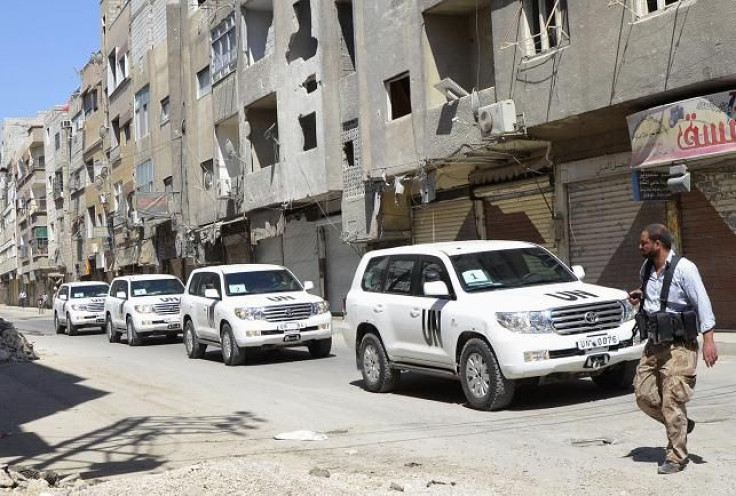US, Blocked At UN, Dismisses Need to Consult on Syria

The U.S. appeared Wednesday evening to be forging ahead with preparations to attack Syria, dismissing a Syrian request to extend chemical weapons inspections and saying it saw little point in further discussion of the issue at the United Nations, where Russia is blocking any action. But opposition in Britain could delay a strike.
President Barack Obama said “there need to be international consequences” for the Aug. 21 chemical strikes, which he said he is convinced were carried out by the Syrian government.
“I have no interest in any kind of open-ended conflict in Syria,” Obama said in an interview with the PBS NewsHour broadcast Wednesday, stressing that he has not decided to order a military attack. "But we do have to make sure that when countries break international norms on chemical weapons they are held accountable.”
A closed-door meeting of the five permanent members of the U.N. Security Council, called to consider a British-drafted resolution authorizing the use of force to prevent any further use of chemical weapons in Syria, adjourned without action Wednesday after Russia and China opposed the measure, the Washington Post reported.
In response, U.S. officials made clear they considered such initiatives irrelevant to Obama’s decision. Although officials gave no indication of when a U.S. attack might occur, they said they expect U.N. inspectors to leave Syria on Saturday.
“We see no avenue forward [at the United Nations] given continued Russian opposition to any meaningful council action on Syria,” deputy State Department spokeswoman Marie Harf said. “Therefore, the United States will continue its consultations and will take appropriate actions to respond in the days ahead.”
She said the administration would not allow Syria to "hide behind a U.N. investigation into the use of chemical weapons to prevent any response from the United States."
U.N. Secretary- General Ban Ki-moon said the inspection team needed four days to complete its work. "It is essential to establish the facts," he said. "The team needs time to do its job."
On Wednesday, the team visited the eastern Ghouta region northeast of Damascus, the zone that apparently was hit hardest by poison gas before dawn on Aug. 21. President Bashar al-Assad's government is suspected of carrying out the attack, which killed hundreds.
Meanwhile, in Britain, Prime Minister David Cameron was forced Wednesday to back off any plans for an imminent military strike against Syria in a humiliating climbdown after coming under fierce domestic and international pressure, Reuters reported.
Just a day after recalling Parliament to vote on how to respond to Syria's suspected use of chemical weapons, Cameron was ambushed when the opposition Labour Party said it wanted greater parliamentary scrutiny and scores of rebel lawmakers in his own Conservative ranks said they would oppose him. Labour demanded clear proof that the Syrian government had used chemical weapons.
Cameron's failure to execute his original plan of action could hamper efforts by the United States to deliver a swift cruise missile strike as early as this week.
Mindful of the legacy of public mistrust left behind by former Labour Prime Minister Tony Blair's bitterly contested decision to go to join the U.S. war on Iraq in 2003, Labour leader Ed Miliband and some rebel Conservatives used the prospect of a government defeat in Parliament to force Cameron to delay action.
After hours of impromptu negotiations between Cameron's political managers and the opposition, his office agreed that the Security Council should see findings from chemical weapons inspectors before it responded militarily.
"The United Nations Security Council must have the opportunity immediately to consider that briefing (from inspectors) and ... every effort should be made to secure a Security Council resolution backing military action before any such action is taken," a British government motion to be debated in parliament on Thursday said.
Britain had previously declined to say it would wait for a U.N. report before launching military action.
But on Wednesday it promised parliament would be given a second vote before Britain committed to direct military action, rather than the single vote - on Thursday - it had initially promised.
"A watered-down motion is better than a defeat for the government," Andrew Bridgen, a Conservative MP who opposed immediate military action, told the BBC. "The motion ... will not allow military action. We need hard evidence."
The Guardian reported that “Whitehall sources” indicated that the U.S., which had planned to launch the strikes by the weekend, is prepared to revive a backup plan to delay the strikes until Tuesday, when Obama is due to set out for the G20 summit in Russia – the Syrian regime’s chief sponsor.
Obama did get a vote of support from NATO, however. After a meeting of the alliance's policymaking arm in Brussels, Secretary-General Anders Fogh Rasmussen said the suspected use of poison gas "cannot go unanswered. Those responsible must be held accountable."
His statement didn't commit NATO to joining a military operation but gave its blessing if one is launched, Jorge Benitez, an analyst with the Atlantic Council of the United States and editor of the NATOsource blog, told the Los Angeles Times. "They're saying, 'We support what you're going to do.' "
© Copyright IBTimes 2024. All rights reserved.











